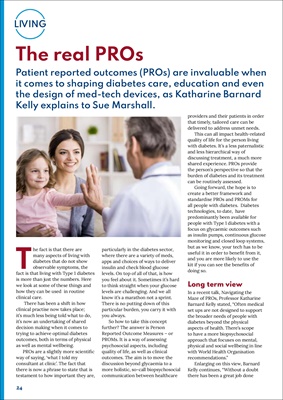
24
LIVING
The real PROs
Patient reported outcomes (PROs) are invaluable when
it comes to shaping diabetes care, education and even
the design of med-tech devices, as Katharine Barnard
Kelly explains to Sue Marshall.
The fact is that there are
many aspects of living with
diabetes that do not show
observable symptoms, the
fact is that living with Type 1 diabetes
is more than just the numbers. Here
we look at some of these things and
how they can be used in routine
clinical care.
There has been a shift in how
clinical practise now takes place;
it's much less being told what to do,
it's now an undertaking of shared
decision making when it comes to
trying to achieve optimal diabetes
outcomes, both in terms of physical
as well as mental wellbeing.
PROs are a slightly more scientific
way of saying, 'what I told my
consultant at clinic'. The fact that
there is now a phrase to state that is
testament to how important they are,
particularly in the diabetes sector,
where there are a variety of meds,
apps and choices of ways to deliver
insulin and check blood glucose
levels. On top of all of that, is how
you feel about it. Sometimes it's hard
to think straight when your glucose
levels are challenging. And we all
know it's a marathon not a sprint.
There is no putting down of this
particular burden, you carry it with
you always.
So how to take this concept
further? The answer is Person
Reported Outcome Measures - or
PROMs. It is a way of assessing
psychosocial aspects, including
quality of life, as well as clinical
outcomes. The aim is to move the
discussion beyond glycaemia to a
more holistic, so-call biopsychosocial
communication between healthcare
providers and their patients in order
that timely, tailored care can be
delivered to address unmet needs.
This can all impact health-related
quality of life for the person living
with diabetes. It's a less paternalistic
and less hierarchical way of
discussing treatment, a much more
shared experience. PROs provide
the person's perspective so that the
burden of diabetes and its treatment
can be routinely assessed.
Going forward, the hope is to
create a better framework and
standardise PROs and PROMs for
all people with diabetes. Diabetes
technologies, to date, have
predominantly been available for
people with Type 1 diabetes with a
focus on glycaemic outcomes such
as insulin pumps, continuous glucose
monitoring and closed loop systems,
but as we know, your tech has to be
useful it in order to benefit from it,
and you are more likely to use the
kit if you can see the benefits of
doing so.
Long term view
In a recent talk, Navigating the
Maze of PROs, Professor Katharine
Barnard Kelly stated, "Often medical
set ups are not designed to support
the broader needs of people with
diabetes beyond the physical
aspects of health. There's scope
to have a more biopsychosocial
approach that focuses on mental,
physical and social wellbeing in line
with World Health Organisation
recommendations."
Enlarging on this view, Barnard
Kelly continues, "Without a doubt
there has been a great job done